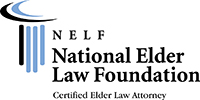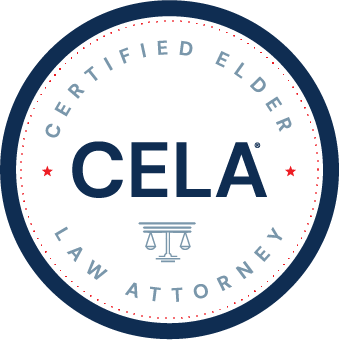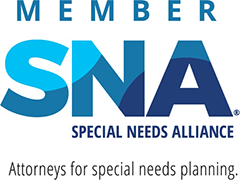By Bradley J. Frigon
After working on this case for over a year the check has been received from the defendant and you are ready to deposit it into your trust account. When you call your client to inform him of the good news, the client tells you that he is now on Medicaid and food stamps and asks “Could this settlement cause me to lose my benefits?” This is when you contact a trusted elder law attorney to make sure you and your client do not have a problem. The elder law attorney should ask you the following questions:
! For what public benefits is the client eligible?
! When was the case settled?
! Are there any contingencies, e.g., must obtain court approval?
! When was the settlement paid out?
! Who is/are the claimant(s)?
! Have you determined the allocation if more than one claimant?
! What are the attorneys’ fees and costs, and have they been paid?
! Are there any liens or claims and, if so, have they been compromised?
! Is the claimant a minor or adult and, if adult, is he competent?
Before you deposit a settlement check into your trust account, you need to understand how the receipt of these funds will affect your client’s eligibility for Medicaid. The rules are complex but working with an attorney that specializes in this type of law will ensure a successful outcome.
The following discussion will analyze whether the deposit of a personal injury settlement into a lawyers’ trust account will constitute an asset for SSI- Medicaid purposes.
Program Basics
Adults and children with disabilities are often dependent upon public benefits to provide them with financial support, medical care, housing and food. Some benefits available to such individuals are insurance entitlements: they are available because someone has paid premiums which qualify the individual for an insurance benefit. Other benefits available to such individuals are means tested: they are available only to individuals whose assets and/or income are below an eligibility ceiling. The receipt of a personal injury settlement, whether paid as a lump sum or received by means of a structured settlement annuity, can have a profound effect on an individual’s eligibility for means-tested benefits.
The most significant benefits available to persons with disabilities are SSDI, Medicare, and SSI, Medicaid. The former two are an insurance benefit: the latter are means-tested.
1. Social Security Disability Income (SSDI) pays a monthly benefit to disabled former wage earners and to their dependents. A disabled child who is dependent upon a disabled or retired Social Security recipient, or upon one who is deceased, can receive a check that is equal to 50% of the parent’s benefit while the parent is living or 75% of the amount to which the parent was entitled or which the parent was receiving at death. SSDI is an insurance benefit. It is not dependent upon financial status.
2. Medicare is health insurance available, inter alia, to disabled persons receiving SSDI benefits (after a two year waiting period) or insured persons who have reached age 65. Medicare is an insurance benefit which is not affected by a person’s financial status. Persons with higher incomes do, however, have to pay higher premiums for Medicare Part B and D.
3. Supplemental Security Income (SSI) is a monthly stipend available to disabled individuals and persons age 65 and older whose income and assets are limited. Countable assets must be less than $2,000 for an individual. Most income is countable and must be less than the benefit level once any income disregards are applied. Until a child reaches the age of 18, a child’s financial eligibility for such benefits is affected not only by the child’s income and assets but also those of the child’s parents: assets and income are “deemed” to the child. At age 18 a child is considered financially independent from his or her parent and no parent child deeming occurs.
4. Medicaid is health insurance available to disabled and some other categories of persons who meet the financial eligibility rules. Medicaid pays for 100% of most covered medical services, attendant care services, vocational training, group homes, and long term nursing home care. There are many categories of Medicaid. For young adults, the most widely used program in Colorado is SSI /Medicaid. To qualify for SSI an individual must be disabled and less than 65 years of age. The individual must have income below the 133% of the federal poverty level ($914) month in 2023).
If a person is married the assets of both members of the couple are counted. However, for long term care Medicaid and certain Home Based Medicaid programs, there are rules that allow the well spouse to protect most of his or her assets from being counted. Most Medicaid programs will penalize (impose a waiting period) persons who divest themselves of assets in order to achieve eligibility unless the assets are divested in favor of certain individuals or trusts.
Resource Determinations for SSI Eligibility Purposes
As previously explained SSI -Medicaid is a means tested program that is asset and income sensitive. If the individual countable assets exceed the $2,000 threshold, eligibility will be lost. In Colorado, the loss of SSI benefits will automatically disqualify the individual from receiving Medicaid.
1. Timing: Resource determinations are made as of the first of the month for SSI eligibility purposes, and is based on what assets an individual has.1If an SSI claimant acquires additional resources during the month, then they are counted under the resource counting rules as of the first of the next month.2 However, the receipt of additional resources during the month will first be evaluated under the income counting rules. Thus the receipt of a settlement may result in an overpayment of SSI benefits for one month.3
2. Assets v. Resources. Not all of an individual’s assets are resources for SSI purposes.4 The distinction is important because an asset that is not a resource does not count against the statutory resource limit (while a resource may count).5 A resource is defined as cash and any other personal property, that an individual owns; has the right, authority, or power to convert to cash (if not already cash); and is not legally restricted from using for his support and maintenance.6
The fact that an “owner” does not have physical possession of the property doesn’t necessarily mean that it is not his resource if he has the legal ability to spend or convert the property and apply towards his support and maintenance.7 Thus, merely holding settlement funds or a judgment award in a lawyer’s trust account does not make the funds or award an asset v. resource. Also, actions of “agent,” such as an attorney-in-fact pursuant to power of attorney or a court-appointed fiduciary are the equivalent to an action on the part of the claimant unless there’s a legal restriction against access and the use of funds or property for the claimant’s support and maintenance.8
3. Liquid v. Non-Liquid Resources: For SSI purposes liquid resources are any resources in the form of cash or in any other form which can be converted to cash within 20 workdays.9 A settlement or judgment that is not yet paid out, and will not be within 20 workdays, is arguably non-liquid. However, the assumption will likely be that a settlement or judgment is liquid unless there is apparent “evidence to the contrary.”10
The POMS give an example of “evidence to the contrary.”11 The example is of a court-appointed guardian who had sole access to the claimant’s financial account. The guardian dies, and until such time as a successor guardian is appointed, no one had authority to access the account. Although non-liquid, the guardianship account continues to be a resource because the claimant owned it and had the legal right to use it for her own support and maintenance. The delay in appointing a new guardian who could access it within 20 days does not eliminate the claimant’s right to the funds.
So, with the above example, a word of caution that, even in those instances where the claimant is a minor or incompetent adult in need of a guardian of the estate or conservator, “delaying” the filing of a petition for appointment does not necessarily mean it is not a “resource” for SSI eligibility purposes. Time is always of the essence! But it may be beneficial and buy the claimant some time if the guardian of the estate or conservator is not appointed until after settlement or a judgment is entered, and condition the settlement on the court’s approval.
4. Legal Restriction Against Use for Support and Maintenance: The POMS do offer one example in which settlement funds or a judgment award held by a lawyer in his trust account will not be a resource that will affect the claimant’s SSI and, thus Medicaid, eligibility. Assets are not available if the claimant does not have the legal ability to make the funds available for his support and maintenance.12 The only reference in the POMS to such a restriction insofar as a settlement or award is concerned is an award to a claimant that is to be used solely for medical expenses related to the injury sustained. In this situation, the SSA takes the position that, although the claimant owns the funds and had direct access to them, he is not legally free to use them for his own support and maintenance.
What is a “Legal Restriction”
Bottom line is that, unless there’s a legal restriction to making the funds available for the claimant’s support and maintenance, the deposit of settlement funds or judgment award into a lawyer’s trust account will be a countable resource for purposes of SSI Medicaid eligibility in the month of receipt.
Although each situation must be analyzed based upon its own facts, for most cases, the following examples will not constitute a “legal restriction” under the POMS.
! Lack of liquidity;
! Lack of physical possession;
! Inaction by an “agent” for the benefit of the claimant;
! A delay in appointing a guardian or conservator for the claimant;
! A delay in petitioning a court to make funds available to the claimant.
Although time is always of the essence, the following examples will generally constitute legal restrictions under the POMS:
! Allocating the settlement among multiple claimants;
! Court approval of settlement or establish a conservatorship for a minor or incapacitated claimant;
! Lien and Claims resolution issues;
! Court order for payment of settlement to purchase home – held in Court account.
Lesson Learned
You never want to put yourself in a situation where you could be liable for a client’s disqualification from public benefits. Before your case settles identify an elder law attorney that you have confidence in to advise you. Having a plan in place will avoid last minute issues and delays in getting the client paid and compensating yourself for all the hard work you put into to the case.
If you have questions about this article or any other related matters, please contact me.
20 C.F.R. §416.1207(a).
Id. at §416.1207(b).
SSA Program Operational Manuel (POMS) Section SI 01110.600.B.1.
SI 01110.100.A.
Id.
POMS SI 01110.100.B.1.
POMS SI 01120.010.
POMS SI 01120.020.
POMS Section SI 01110.300.
POMS SI 01110.305.B.2.
POMS 01110.305.C.2.
POMS SI 01120.010.D 5.












